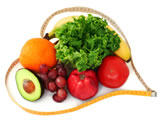Nutritional Wisdom, Weight Loss Power
- posted by The FitClick Team
- Wednesday, April 21, 2010 at 11:55 AM filed under diet postings
 Before you fill up your plate, fill up on food calorie facts. While dieting, you'll need to examine your meal choices and track the food calories you eat. To lose weight, use our calorie calculator to determine your daily calorie intake number. Then, design a weight loss program with fewer calories consumed and more calories burned with exercise. It sounds simple enough. But, as we know, it’s all too easy to get off course. So, plan ahead. Before you cruise the grocery aisles, or order at a restaurant, take a minute to search for smart, diet-compliant foods.
Before you fill up your plate, fill up on food calorie facts. While dieting, you'll need to examine your meal choices and track the food calories you eat. To lose weight, use our calorie calculator to determine your daily calorie intake number. Then, design a weight loss program with fewer calories consumed and more calories burned with exercise. It sounds simple enough. But, as we know, it’s all too easy to get off course. So, plan ahead. Before you cruise the grocery aisles, or order at a restaurant, take a minute to search for smart, diet-compliant foods.
With the How Many Calories food search, find foods and portions that fit your calorie budget. See specific foods, broader food categories, and fast foods with their nutritional information (calories, carbs, proteins, and fat) displayed in common serving units. If you have 100 calories allotted for an afternoon snack, you could search for popular fruits. From the results, you’ll learn that you may eat 1 ¼ cup blueberries, 1 smaller banana, 2 cups sliced strawberries, or 1 medium apple to meet your target.
To achieve lasting resulting, use nutritional knowledge to make better day-to-day food choices and change your diet habits. Pit similar foods against one another, comparing their information, to determine the best options for your meals and snacks. In general, simply knowing how many calories are in your favorite fast foods, snacks, and sweet treats will motivate better diet decisions. You're more likely to think twice before indulging in too much pizza, potato chips, or ice cream if you know the caloric cost ahead.
Make better food selections, prevent calorie miscalculations, and spark ideas for creating healthy, well-balanced meals with our How Many Calories food search. In conjunction with our diet tracker and calorie counter, use this feature to build and maintain a successful, sustaining weight loss program. As you track personal data, foods eaten, and workouts, see the rate by which you're losing or gaining weight. No more guesswork. No more surprises when you step on the scale. You'll know exactly what to eat and when to cut back and work harder.